- Home
- Richard Lee Byers
The Haunted Lands: Book III - Unholy Page 3
The Haunted Lands: Book III - Unholy Read online
Page 3
Looking like a reflection of himself cast in cloudy, rippling water, Mirror popped into view. Bareris looked down at his hands and saw that he was visible, too, and that the charm that had given him the appearance of a vampiric nobleman had dissolved.
Concealed doors flew open. Four boneclaws sprang from the closets in which they’d waited with the mindless patience of lesser undead for someone to come along and trigger this particular trap.
Bareris supposed he’d stepped on a rigged floorboard, an unseen rune, or something similar. He tried to tell Mirror to engage the two boneclaws on the right, but found he had no voice. The blaze of magic he’d unwittingly evoked had both deprived him of his invisibility and shrouded the room in an enchantment of silence.
As a defense, it made sense. Red Wizards had reason to fear rivals in their own hierarchy as much or more than any other foe, and quiet deprived a mage of the greater part of his magic.
As it divested a bard of every last bit of his. Bareris would have to rely on his sword.
Mirror, however, had other options. He raised his blade above his head, and it gave off a golden glow like sunlight. He’d summoned the divine light that was anathema to undead, anathema in theory even to Bareris and himself, but somehow he managed to wield it without annihilating himself or hurting his comrade.
One of the boneclaws on the right cringed, unable to continue its advance. The others kept charging forward. It was about as good a result as Mirror could expect, given that he was trying to evoke the sacred on the home ground of a vampiric necromancer.
Bareris lunged at the two boneclaws on the left. They snatched for him, and their already enormous talons shot out, stretching instantaneously to more than twice their normal length. They likely would have speared a less canny opponent, but he’d seen the trick before. He dived underneath the attack, plunged on between the two crimson-eyed creatures, whirled, and hacked at the back of a knee.
The boneclaw he’d cut pitched forward, but the other, startlingly quick for something so large, was already whirling around. It raked with both hands, talons elongating into blades like scythes, filling the space between itself and its foe.
Bareris leaped backward. It was the only way to avoid being sliced and impaled. He sensed the wall behind him and realized he wouldn’t be able to retreat again.
The boneclaw scrambled after him, and he instantly sprang to meet it. The move surprised it, threw off its aim, and when it slashed downward, the attack arrived harmlessly behind him. He cut into its midsection and tore away chunks of wormy, desiccated muscle and gut.
The boneclaw toppled. Glimpsing motion from the corner of his eye, Bareris spun. The creature he’d merely crippled had come crawling after him. Its talons shot out at him, and he wrenched himself out of the way. Then Mirror, who currently resembled an undersized boneclaw himself, rushed in on the creature’s flank and sheared into its neck. Its body jerked into rigidity, then collapsed.
Bareris glanced around, making certain the ghost had destroyed the other two boneclaws before coming to his aid. He had, but new foes appeared in the doorway leading deeper into the apartments: another pair of boneclaws and Muthoth himself, clad in a nightshirt but with a jet black staff clasped in his intact hand and several amulets dangling around his neck. Apparently Bareris had also activated an alarm that roused the vampire from his rest.
The fresh boneclaws advanced. Muthoth stayed behind them in the doorway and surveyed the situation. Then he swirled his maimed hand through a serpentine mystic pass, and the unnatural silence ended. Bareris could hear the slap of the boneclaws’ feet on the floor, and the minute creak of their leathery sinews.
He realized Muthoth had scrutinized him, observed that he looked like a warrior, not a mage, and drawn the erroneous conclusion that he couldn’t work magic. The necromancer thought to dispel the unnatural quiet and so regain the use of his own spells.
If he didn’t realize Bareris was a bard, that meant he didn’t know him at all, didn’t even recognize the man whose life he’d devastated. For some reason, the thought was maddening.
Muthoth chanted, and a carrion stench filled the air. Bareris stepped back, leaving Mirror to engage both boneclaws, and quickly sang his own charm of silence, each descending note softer than the one before. Muthoth’s voice cut off abruptly, leaving his incantation unfinished and the spell wasted. The lustrous eyes in his pale face widened in surprise.
Bareris ran forward, trying to maneuver around the boneclaw on his left. Despite Mirror’s efforts to hold its attention, it pivoted and slashed at him, and though he dodged, one of its talons sheared through his ribs. The stroke would have killed a living man, but he was undead and enraged and scarcely broke stride.
Muthoth retreated before him, back into the next room. As he did so, he thrust out his staff, no doubt a repository of magic he could employ even in the absence of sound. Shadows leaped and whirled, and suddenly Bareris felt numb and confused, his hatred dulled and meaningless.
Muthoth was trying to control his mind. Bareris forced himself to take another racing stride and another after that, clinging to anger and purpose, and the dazed, bewildered feeling fell away.
The vampire pressed his mutilated hand to an iron amulet, and a gray, vaporous thing with a lunatic’s twitching face hurtled out of it. Bareris sidestepped the spirit’s frenzied, scrabbling attack and cut through the middle of it. It broke into floating, vile-smelling wisps.
He closed the distance to Muthoth. Cut to the head. The vampire dropped under the stroke as his body reshaped itself, flowing from human form into the guise of a huge, black wolf.
Muthoth sprang. His forepaws hit Bareris in the chest and knocked him onto his back. Eyes blazing, icy foam flying from his muzzle, the vampire lunged to seize his adversary’s throat in his fangs.
Bareris just managed to interpose his forearm, and Muthoth’s jaws clamped shut on it instead. The lupine teeth cut deep, and Muthoth jerked his head back and forth. Bareris felt the jolting agony as the limb started to tear apart.
His sword was too long to use in such close quarters. He let go of it, drew up his leg, and groped for the secondary weapon he kept tucked in his boot. He drew forth the hawthorn stake and drove it into Muthoth’s body.
The vampire flopped down on top of him and lay motionless. Evidently Bareris had pierced the heart.
He rolled Muthoth off him and clambered to his feet. He felt the hot itch as his wounds began to heal. Peering back the way he’d come, he saw that Mirror had already destroyed one boneclaw and, by the looks of it, was about to dispatch the other.
Bareris stooped, gripped Muthoth by the throat, and dragged him farther into the suite, until they passed beyond the magical silence. By that time, the vampire had reverted to human shape, give or take pointed ears positioned too high on his head and a few patches of fur.
Bareris knelt down, positioning his face in front of Muthoth’s unblinking eyes. “Do you know me now?” he asked. “I’m Bareris Anskuld, the bard who overtook you on the way to Delhumide. And now I’m going to destroy you as you destroyed me.”
He raised his sword and struck Muthoth’s head off. Then he watched the two pieces of the necromancer’s body rot and realized he didn’t feel anything at all.
Mirror found Bareris standing over Muthoth’s crumbling, stinking remains. “Well done,” he said.
Bareris frowned. “We fought this battle in silence. With luck, no one else knows it happened. Maybe we have time to look around a little.”
“And carry away something useful,” Mirror said. “Let’s do it.”
Bareris hung Muthoth’s amulets around his own neck and picked up his black, gleaming staff. Then they prowled farther into the vampire’s apartments.
They soon came to a portrait of a Red Wizard whose cool, crafty eyes and thin-lipped, resolute mouth seemed a mismatch with a rather weak chin. And when they saw the same face depicted again in a painting above the fireplace in a library, Bareris said, “I know where we are
.”
“What do you mean?” Mirror asked.
“A hundred years ago, this was more than a chapterhouse of the Order of Transmutation. It was the residence of Druxus Rhym himself, or one of them, anyway. I never knew the man, but when I was a boy, I saw him once or twice, riding in a procession, and that’s him.”
Mirror, of course, had never known Druxus Rhym. He’d been a broken, essentially mindless thing wandering the Sunrise Mountains when Druxus had been alive. But he’d heard his comrades speak of the zulkir whom Szass Tam had assassinated at the very start of the lich’s long campaign to become sole ruler of Thay.
“If these books belonged to an archmage,” he said, “there may be some powerful grimoires here.”
“Let’s hope I have the wit to recognize them,” Bareris said. “You stand watch while I flip through them.” He pulled a volume from a shelf.
And several books later, he whispered, “By the silver harp!”
chapter two
13 Ches, The Year of the Dark Circle (1478 DR)
Well?” demanded Aoth. “Don’t stop now. What did you find?” Across the study, Khouryn mumbled and rolled over in his sleep.
“This,” Bareris replied. He opened the pouch strapped to his belt and brought out a small volume bound in crimson. It didn’t look old or in any way special, nor could Aoth feel any arcane power smoldering inside it.
“All right,” said Aoth. “Do you expect me to sit and read the cursed thing, or are you going to tell me what’s in it?”
“I’ll tell you,” Bareris said. “It’s just … it’s strange, crazy even, and I need you to understand and believe.”
Aoth frowned in perplexity. Never before had he seen his old friend fumble for words. Even after despair and the lust for vengeance ruined him, Bareris had retained the facile tongue of a bard.
“Just spit it out. After all the weird and terrible things the three of us have survived together, of course I’ll believe you.”
“Very well. Do you remember the question Malark always used to ask?”
Aoth felt a pang of anger at the thought of the spymaster and false friend who’d betrayed the southern cause. “Why did Szass Tam murder Druxus Rhym, his own ally on the Council?”
“Yes. After reading this book, I finally know.”
“That’s nice, I suppose, but does it really matter at this late date, more than ninety years after the lich pushed us and the rest of his opponents out of Thay?”
“It matters. Do you also recall the story Quickstrike the grave-crawler told me?”
For a moment, Aoth had no idea what Bareris was talking about, and even when he did remember, the question seemed so bizarre that he wondered if decades of loneliness, anguish, and undeath had finally driven his friend completely mad.
“Dimly. Thousands of years ago, there was a kingdom in the Sunrise Mountains. Its greatest wizard and hero was a fellow named … something about digging …”
“Fastrin the Delver.”
“Right. Somebody stole something from this Fastrin, and the loss deranged him. He slaughtered his own people and even mangled the psyches of their ghosts—Mirror here was one such victim—and when he’d destroyed the realm, he committed suicide.”
“That’s right,” Mirror said, “and now I can add to the tale. Recent events have stimulated my memory, even though much is still lost to me.
“My friend Fastrin spent much of his time exploring ancient ruins,” the ghost continued, “and his stolen treasure was an article he had unearthed on one such expedition: a book from the dawn of time. He claimed it contained ‘the death of the world,’ and after it disappeared, he was terrified the thief would unleash the power inside it. In his frenzy, he saw only one solution: kill everyone, just to be sure of getting anybody who’d learned the secret, and strip our spirits of reason and memory.”
“It’s a sad story,” said Aoth, “and I don’t mean to sound indifferent to your misfortune, but how can it possibly be relevant to anything that’s going on today? You’re not going to tell me that this volume you brought me is Fastrin’s book? If that thing is thousands of years old, I’ll eat it with pickle relish!”
“It isn’t,” Bareris said. “Two months ago, we stumbled across a collection of books that belonged to Druxus Rhym. This is one of them, written by Druxus himself. It’s a series of scholarly notes and musings on a different volume, which, unfortunately, was missing.”
Aoth shook his head. “Not the same book Fastrin found?”
“Yes,” Bareris said, “with Fastrin’s own notes appended to the back of it. Somehow it survived to the present day and fell into Druxus’s hands. He doesn’t say how, and we’ll likely never know.”
“What does he say?”
“The original book contains instructions for destroying everything. All life. The land, sea, and sky. The gods themselves.”
Aoth snorted. “That sounds useful.”
“It could be, because you wouldn’t just obliterate them. You’d change them from essence to the pure potential that existed before anything else, even time and space. And then you—”
“I take it that the ritual contains a cheat that allows ‘you’ to survive unharmed amid all the annihilation.”
“Yes, your soul, at least, if not your body. And then you could seize all that potential and build a new cosmos exactly to your liking, with yourself as master.”
“Ah! And here I thought we were discussing something silly.”
Bareris scowled. “Druxus saw the ritual as the greatest imaginable work of transmutation, and for that reason, it intrigued him. But he also believed the practical difficulties were insurmountable, and that no wizard could ever perform the experiment even if he was crazy enough to want to try. He regarded the treatise as purely theoretical, an intellectual game, one that Szass Tam too might find interesting. And so, at the end, his notes indicate his intention to pass the book along to the necromancer.”
“And you think Szass Tam read it and decided that he wanted to work the magic.”
“Yes. It explains things that have always puzzled us. Why did Szass Tam finally strike for supreme authority in Thay after sharing power with his fellow zulkirs for centuries? Because he needed a completely free hand to make the realm over into a place where his ‘Great Work’ would be possible. Why did he kill Druxus? Because no one could know of his intent. Nobody would serve him knowing he plans to murder us all in the end.”
“I suppose not. But still, this is all just speculation on your part.”
“No. In his notes, Druxus tells us what the magic requires. It requires what Szass Tam has spent the last century creating. Hordes of undead and wizards mindbound to a single master so they can perform ritual tasks in concert even when miles apart. Huge circular monuments to raise the necessary power.”
“You’re talking about those new fortresses I’ve heard about.”
“Yes. Dread Rings, the people call them. Mirror and I have seen a couple, and they look exactly like this.” Bareris opened the book and held it out for Aoth to examine. On the exposed pages, Druxus had sketched a black, circular structure with spires rising above the walls in a jagged, asymmetrical pattern.
Aoth realized that at some point and for some reason, the discussion had stopped seeming as ludicrous as it should. He swallowed away a dryness in his throat. “But still, the fundamental idea … it’s just not possible.”
“Fastrin,” Mirror said, “was as great a mage as any you have known. And he took this threat so seriously that it unhinged him and drove him to commit unspeakable crimes.”
“I don’t say the untried magic would achieve the promised result,” Bareris said. “I have no way of knowing. Even if I got a look at Fastrin’s book itself, I don’t have the understanding of wizardry it would take to evaluate the contents. But based on what Druxus wrote and Szass Tam’s manifest interest, I do believe the rite will do something. If it merely unleashes another cataclysm like the Spellplague, that’s bad enough, wouldn’t
you say?”
“I guess,” said Aoth. “But it’s hard to believe that even Szass Tam would dare so reckless a gamble.”
“Hard, perhaps, but impossible? You knew him, first as one of your masters and then as your enemy. You have experience of his limitless self-assurance, the grandiosity of his vision, and his ruthlessness. And I tell you again: he’s built the rings. The last one was nearly finished when Mirror and I slipped out of Thay. It may be completed by now.”
“All right. But why did you seek me out?”
Bareris frowned. “Surely it’s obvious. The only way to stop Szass Tam is by force of arms, and you have an army. Even hiding in Thay, Mirror and I heard tales of your campaigns.”
“What I have is a mercenary company, and I like to think it’s the finest in the East. But do you think it could stop Szass Tam from doing anything he wants when all the council’s legions failed before?”
Mirror said, “We have to try.”
“No,” Aoth said, “I don’t. I won’t lead the Brotherhood into certain ruin. I worked too hard to build it, and the men deserve better.”
“If the whole world burns—”
“But you don’t know that it will. All you have is a few jottings and a cartload of conjecture. Even if you’re right about Szass Tam’s intentions, maybe this mad scheme won’t accomplish anything. Or maybe somebody with a realistic hope of stopping it will intervene.”
“Don’t you see,” Bareris said, “we thought we lost the war. But in truth, it’s still going on, and if we stop Szass Tam from getting what he wants, then we win.”
Meaning, you finally achieve a measure of revenge, thought Aoth. Whatever Szass Tam’s planning, that’s all you truly care about.
“I’m sorry,” he said aloud. “The Brotherhood of the Griffon already has a contract for the coming season. Now, it goes without saying that you’re welcome to stay here as long as you like …”

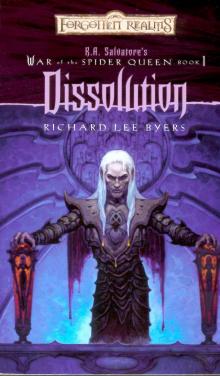 Dissolution
Dissolution Arkham Horror- Ire of the Void
Arkham Horror- Ire of the Void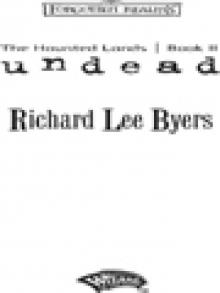 The Haunted Lands: Book II - Undead
The Haunted Lands: Book II - Undead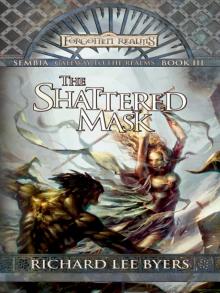 The Shattered Mask
The Shattered Mask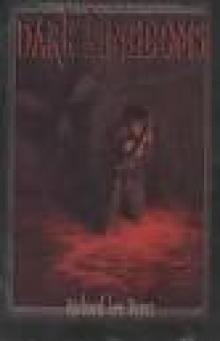 Dark Kingdoms
Dark Kingdoms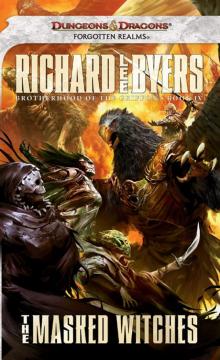 The Masked Witches: Brotherhood of the Griffon, Book IV
The Masked Witches: Brotherhood of the Griffon, Book IV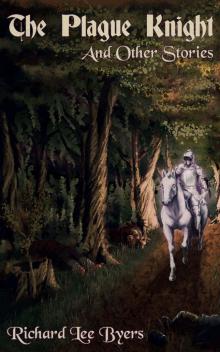 The Plague Knight and Other Stories
The Plague Knight and Other Stories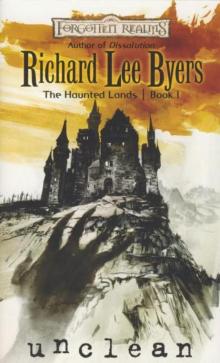 Unclean: The Haunted Lands
Unclean: The Haunted Lands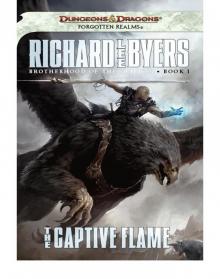 The Captive Flame: Brotherhood of the Griffon • Book 1
The Captive Flame: Brotherhood of the Griffon • Book 1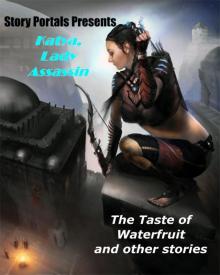 The Taste of Waterfruit and Other Stories (Story Portals)
The Taste of Waterfruit and Other Stories (Story Portals)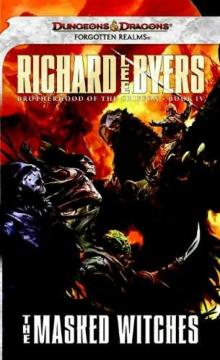 The masked witches botg-4
The masked witches botg-4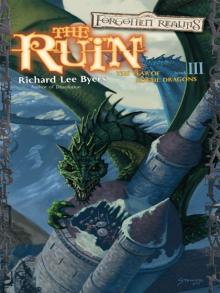 The Ruin
The Ruin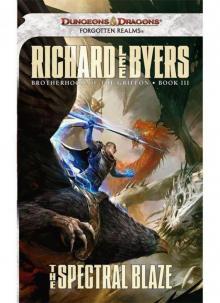 The Spectral Blaze botg-3
The Spectral Blaze botg-3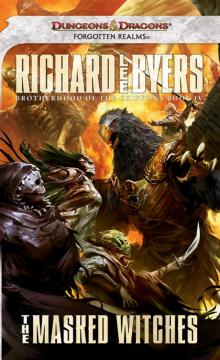 The Masked Witches
The Masked Witches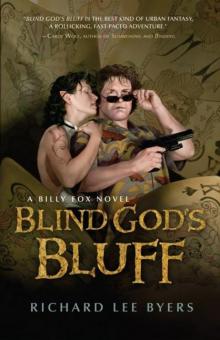 Blind God's bluff bf-1
Blind God's bluff bf-1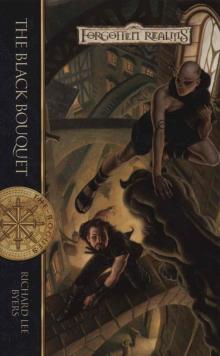 The Black Bouquet r-2
The Black Bouquet r-2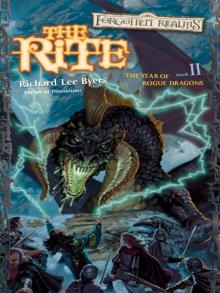 The Rite
The Rite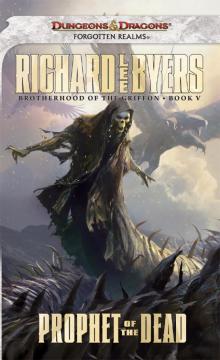 Prophet of the Dead: Forgotten Realms
Prophet of the Dead: Forgotten Realms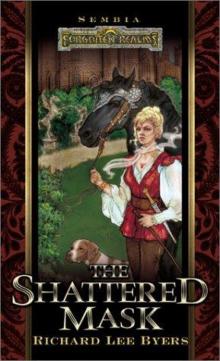 The Shattered Mask s-3
The Shattered Mask s-3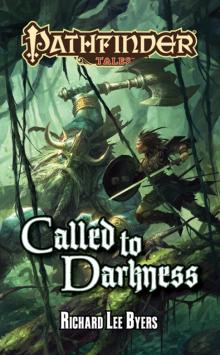 Called to Darkness
Called to Darkness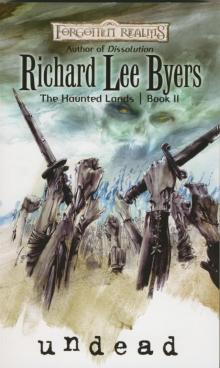 Undead hl-2
Undead hl-2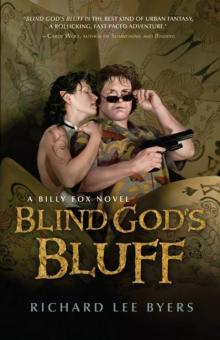 Blind God's Bluff: A Billy Fox Novel
Blind God's Bluff: A Billy Fox Novel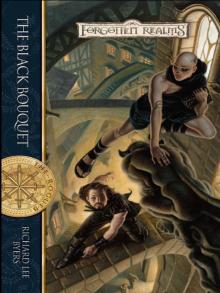 The Black Bouquet
The Black Bouquet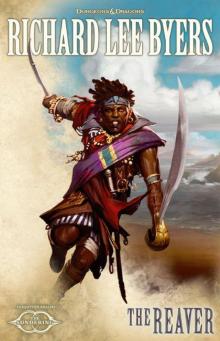 The Reaver
The Reaver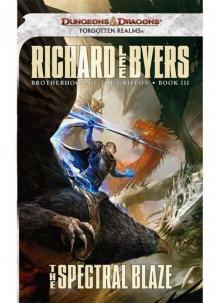 The Spectral Blaze: A Forgotten Realms Novel
The Spectral Blaze: A Forgotten Realms Novel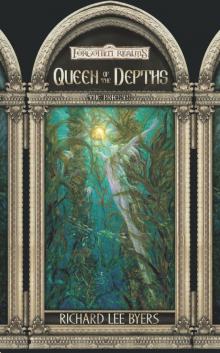 Queen of the Depths
Queen of the Depths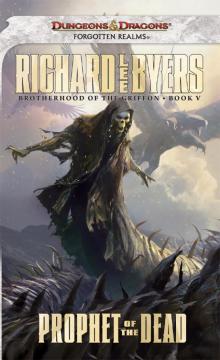 Prophet of the Dead botg-5
Prophet of the Dead botg-5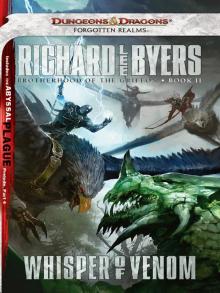 Whisper of Venom: Brotherhood of the Griffon, Book II
Whisper of Venom: Brotherhood of the Griffon, Book II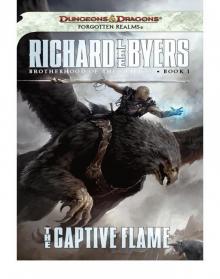 The Captive Flame botg-1
The Captive Flame botg-1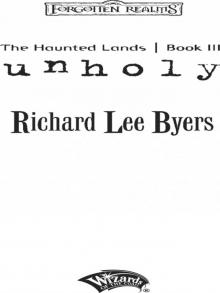 The Haunted Lands: Book III - Unholy
The Haunted Lands: Book III - Unholy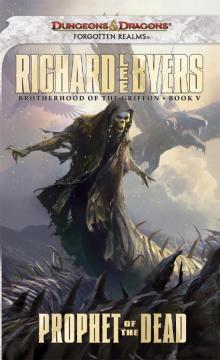 Prophet of the Dead
Prophet of the Dead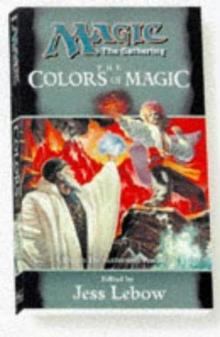 The Colors of Magic Anthology (magic: the gathering)
The Colors of Magic Anthology (magic: the gathering)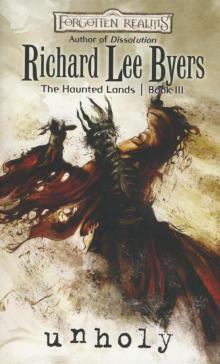 Unholy hl-3
Unholy hl-3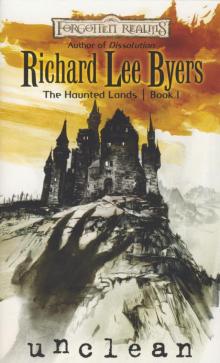 Unclean hl-1
Unclean hl-1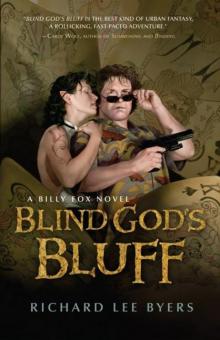 Blind God's Bluff
Blind God's Bluff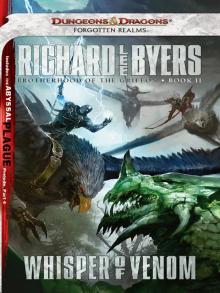 Whisper of Venom botg-2
Whisper of Venom botg-2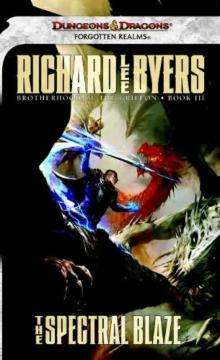 The Spectral Blaze
The Spectral Blaze